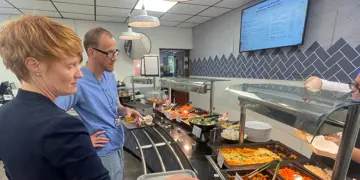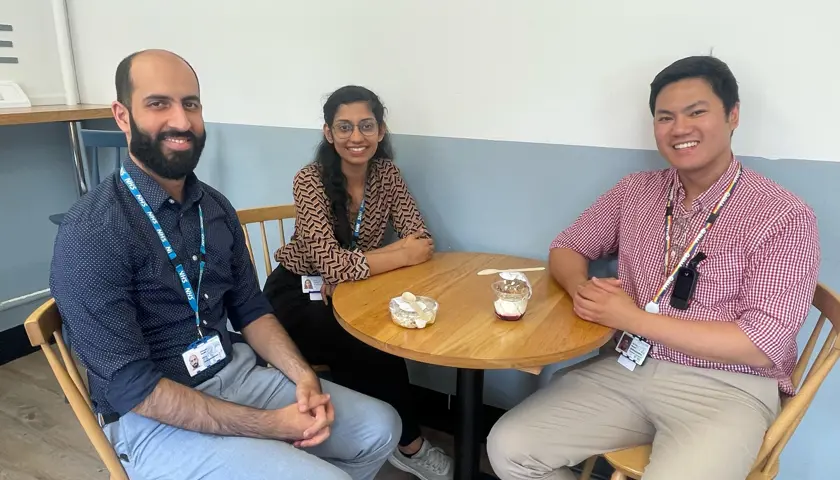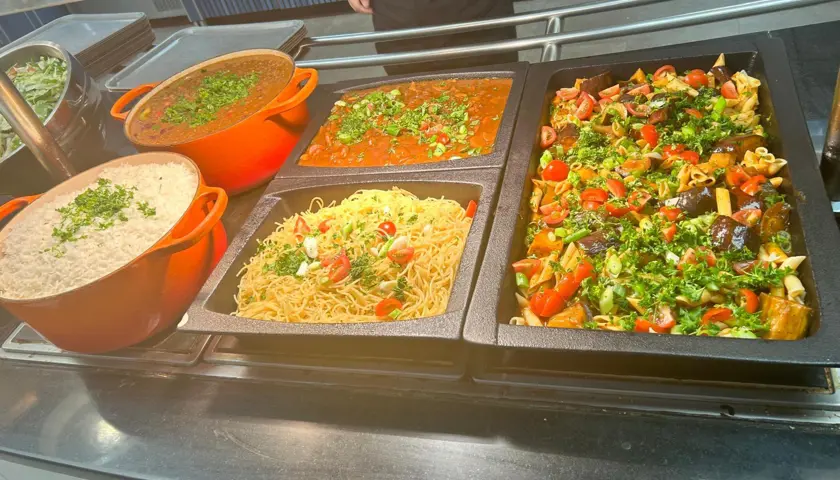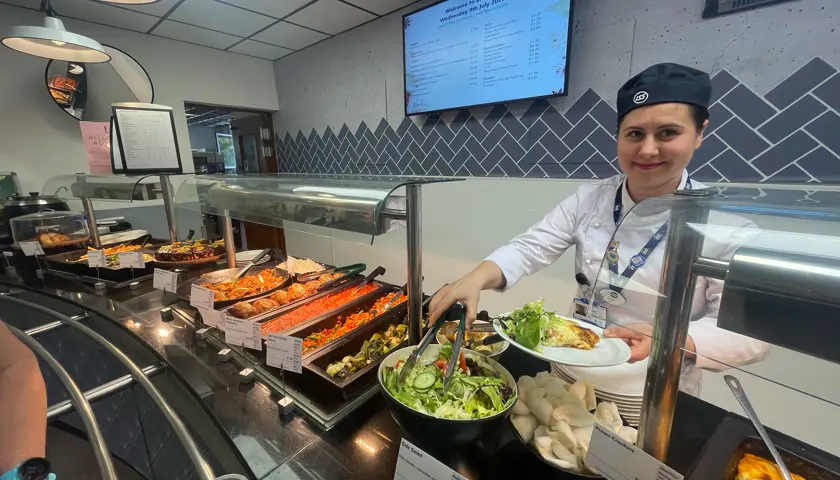Binning the beige buffet
Binning the beige buffet
Health service catering has tended to offer little in the way of either 'health' or 'service', but it's not all pie, chips and pop, as Ben Ireland discovered at a hospital determined to do better
‘Let food be thy medicine and medicine be thy food.’
The quote, commonly attributed to Hippocrates, still resonates today.
Yet food at hospitals, for staff and patients, has for a long time been the subject of negative connotations, often compared with that found on aircraft. A 'beige buffet', as it can be disparagingly called – think processed and reheated ready meals rather than the fresh food you can find in healthy cafés and delis.
However, a growing movement is seeking to improve hospital food, in terms of nutrition, choice and sustainability. It could be the end of cold chips, sweaty burgers, sloppy mac ‘n’ cheese or a £6.50 sandwich, crisps and can of fizzy pop meal deal for staff at the hospitals involved.
Doctors, often under immense time pressure if on-call, working overtime or on short breaks, may be among the main beneficiaries of improvements to on-site food.
Tuscan beans and stir-fried greens
The RNOH (Royal National Orthopaedic Hospital), in north-west London, introduced changes to the menus in its staff canteen last year as part of a collaboration with US non-profit organisation Greener by Default.
On-site canteen Broccles, contracted out to catering firm ISS, now offers a 50:50 ratio of vegetarian to meat-based meals. On the day The Doctor visits, options include Mediterranean garden lasagne and sticky tofu bulgogi (both £4.70), meatball pasta bake (£5.45), chicken massaman curry (£4.40), with side salads (£1.25), stir-fried greens (£1) and Tuscan bean soup (£1.80) available, as well as build-your-own wraps (£6.60) and pizzas (£11.52).
Some of the traditional catering canon still appears – there are still fish and chips on Fridays for example – but healthier options are always available as well.
We sat down for lunch with resident doctors Rachel Stephen, Hishaam Sheikh and Tho Vinh Nguyen, who were pleased to see their hospital take the lead in driving change in this area.
Dr Stephen used to live on site, when she ‘relied on the canteen’, but eats there less often since moving out. She says ‘when the wards get really busy it’s easier to bring snacks’ but is largely positive about the canteen food since the changes made last year.
‘Sometimes it’s hard to find the balance in our jobs but it’s good to have more healthy options available,’ she says. ‘Before, the vegetarians used to flock at the wrap station, I might have had a jacket potato with tuna or something like that. But now, there are a lot of people in all queues with more options available.’
Here, the variety is good. At my previous hospital, it was the same every day
Hishaam Sheikh
On the day of our visit, Dr Stephen had the meatballs, but says she often chooses plant-based dishes because the available options are now quite appetising.
She notes the difficulties doctors working weekends can face finding a fresh, or hot, meal. She says large hospitals, particularly those with emergency departments, should offer a full canteen service at weekends.
Dr Sheikh lives on site at the RNOH and eats at the canteen once or twice a week. ‘Since I’ve worked here, I’ve noticed there are always vegetarian options available,’ he says. ‘I don’t tend to have them myself but it’s nice to have the option.’
At another hospital he worked at, Dr Sheikh recalls a vegetarian colleague looking ‘quite miserable’ with the meal they had because it was small and not well balanced. He said it is important for hospitals to cater for vegetarians, as well as those with intolerances such as gluten but that doesn’t mean cutting out meat options for others.
He adds: ‘Here, the variety is good. At my previous hospital, it was the same food every day.’
Dr Nguyen also eats at the canteen once or twice a week, if he doesn’t bring leftovers from his previous night’s dinner.
‘For a long time, it felt like it was always chicken thighs and things like that,’ he says. ‘I’ve noticed that there’s more choice now. I had an aubergine Katsu curry the other day, and it was amazing. I’ll probably go and cook that myself now.’
Dr Nguyen, however, notes food options can be sparse during on-calls. He usually relies on vending machines but the doctors’ mess at a previous trust he worked at supplied ready meals. ‘It meant that every time you were on-call you knew you’d have something to eat.’
The BMA’s fatigue and facilities charter urges employers to provide adequate, varied, efficiently served and freshly prepared meals for staff, including healthy-eating and vegetarian options and options for a range of cultural and dietary requirements. It also recommends catering facilities are open until 11pm, and that trusts make hot food available when canteens are closed.
More appetising
At the RNOH, revamped menus have led to a 40 per cent reduction in the canteen’s carbon footprint, owing mainly to a 33 per cent reduction in the amount of meat in the meals it offers, through lowering the number of meat options and ‘bulking’ meat dishes with plant-based proteins such as lentils and beans.
However, while the trust is celebrating its sustainability win, that isn’t the only hook for the changes. In fact, a ‘Meat Free Mondays’ initiative in 2024 didn’t land well, with some complaints about access to meat being denied. So, when a three-month pilot followed, changes were brought in through a ‘covert, rather than an overt’ strategy, sustainability manager Michelle Nolan explains.
It was to her amusement then when she received an email from consultant anaesthetist Matt Henley (pictured top, right), asking if something could be done on food sustainability in the staff canteen.
‘It already has,’ she responded, pleased that the changes had gone largely unnoticed, while satisfaction scores had risen slightly. ‘We’ve not just reduced meat, we’ve also made the food more appetising,’ says Ms Nolan.
‘It’s not about taking things away but offering more options. If it looks nice, and is tasty, people don’t always think about whether it has meat in it or not.’
Dr Henley says: ‘I’d thought “we have to do something about reducing our meat consumption”. Embarrassingly enough, it had already been done. I hadn’t even noticed.’
After tucking into a plate of tofu with stir fried vegetables and prawn crackers, he says: ‘I qualified in 2002, so have eaten in a lot of canteens. The food has always been acceptable, not amazing. But eating here is very good. In an ideal world we would have everything cooked from scratch, but that’s not really feasible [for hospital catering].
‘I eat absolutely everything. Recently, I’ve been trying to eat more healthily. Rather than necessarily removing meat, it’s about adding more fibre to my diet – which means a higher proportion of plants. So, I like what they’ve done.
‘I would choose something healthier to eat while I’m working. Then you can enjoy more treats, like a barbecue for example, when you’re at home. And now the healthy options are also tasty. I picked this [tofu] because of the flavours. There was a veggie madras curry the other day, it was delicious, although I would’ve preferred a little extra chilli.’
Rather than necessarily removing meat, it's about adding more fibre to my diet
Matt Henley
Dr Henley often brings his own lunch in, usually leftovers, partly out of habit and cost-effectiveness but also because the nature of his role means he might be working overtime in theatre.
‘It’s nice to know I can now find something healthy on the days I do eat here,’ he says. ‘But I do still often treat myself to fish and chips on a Friday.’
Consultant orthopaedic surgeon Liz Tissingh (pictured top, left), who is a vegan, usually brings her own food in.
She says: ‘I’ve been plant-based all my adult life and most canteens don’t cater for that, especially if it’s after core lunch hours.’ And getting to the canteen during these core hours is certainly not possible for many staff at the hospital, especially those working in theatre.
‘Often you find vegetarian options are pasta with no protein, but you do find balanced vegetarian meals here. I’ll probably keep bringing in my own lunch, as I always have and I know exactly what I’m going to get. Even though our canteen is making a real effort, I had a dairy yoghurt today because there were no vegan ones. It could go further, but I appreciate you have to bring people along with you.’
She said 24/7 food options elsewhere in the hospital, like ‘smart fridges’ (which are connected to the internet and can tell, for example, when items need replenishing), have also improved but by their very nature do not feel fresh and healthy.
Miss Tissingh and Dr Henley say there is too much onus on individuals to make healthy food choices, in terms of hospital staff and in society more generally, and that more canteens should take steps to provide, and actively encourage, healthier choices.
They also called for food subsidies for NHS staff, who often don’t have time to go off-site for their lunch. The RNOH’s initiative to give discounts to those who bring in their own reusable lunchboxes, or coffee cups, helps incentivise sustainability, but the doctors suggest the days they’re more likely to eat in the canteen are when they haven’t planned. Both would like to see free fruit offered to staff, which is the case at some hospitals.
Natalie Healy, lead dietician at the RNOH, supports the changes at the canteen. She says: ‘We are in an obesity crisis, so offering plant-based alternatives is positive. It’s not a question of staff not being able to access other food if they want to – I’ve seen Deliveroo ordered to the hospital.
‘Hospitals should be healthy eating institutions. It’s about setting a good example. It’s been a big change, culturally, in this hospital. But I fundamentally believe that it’s better for our health to eat more plants.’
Patient needs
Noting how obesity rates are higher among healthcare professionals in England, Mrs Healy says this can be down to shift work, irregular eating patterns, tough working conditions and poor on-site facilities. ‘If you can offer healthy food while staff are here, that helps,’ she says.
Mrs Healy still tends to bring her own lunch – pasta puttanesca the day The Doctor visits – but notes how another dietician at the trust, who is vegan, now visits the canteen when they didn’t before. ‘Things have improved massively,’ she adds. ‘Not just because there’s more plant-based, but the meals are more balanced and better presented. Although maybe the portion sizes are a bit big sometimes.’
Dietician Amy Roach, who runs Greener by Default in the UK, says hospitals are a ‘great place’ to be focusing on rolling out plant-based food. ‘We want staff to be healthy and for healthcare professionals to set an example,’ she says.
‘Making the case for staff food is quite straightforward. It’s following government-recommended healthy eating guidelines. Plant-based diets are more inclusive; there are less things people can’t have for dietary or religious reasons than meat alternatives.’
However, she notes: ‘For patients, it can be more specific to their needs based on their illness or condition.’
Things have improved massively... the meals are more balanced and better presented
Natalie Healy
Mrs Healy agrees. She explains that an upcoming trial at the RNOH to increase plant-based food offerings among patients is focused on spinal injuries. This is because spinal injury patients often face neurogenic bowel dysfunction as a result of surgery so benefit from more fibre, which lends itself to a plant-heavy diet.
As well as this, plant-based diets typically have less fat, especially saturated fats, so could also aid spinal injury patients, who are at four times more risk of developing cardiovascular disease than the general population and twice as likely to develop type 2 diabetes.
‘There are few hospital groups where we can safely explore this,’ says Mrs Healy. ‘There’s no consensus on having [solely] plant-based diets in hospital settings. But we have this group where the needs align beautifully.’
On the other hand, she says some patient groups – such as in oncology – require more calories to aid recovery. And because oncology patients typically have lower appetites, plant-based diets are not the most effective way to increase the intake. ‘So, for example, the Royal Marsden couldn’t really entertain this idea,’ says Mrs Healy.
That said, she adds that a plant-heavy diet can help prevent cancers and obesity in the first place, ‘so from a public health point of view we should be promoting this [type of diet]’.
Would some patients turn their nose up at being offered plant-based meals? ‘That stigma of hospital food is so ingrained,’ says Mrs Healy. ‘Sometimes you can change people's appetites just by how you describe the food. That’s something we’re really working on.’
The reality for patients at the RNOH is that most meals are prepared through what is called ‘cook-chill’, which means meals are pre-cooked, refrigerated and reheated. This is down to both logistical issues and cost pressures. The patient restaurant, which offers the same options as the staff canteen, is open three days a week.
Mrs Healy says patients are ‘usually pleasantly surprised’ with their meals. But she would like to see a future where hospital meals can be tailored to patient needs, with the right balance of proteins, carbohydrates and vegetables to best aid their recovery based on their specific circumstances. But she accepts that doing this with fresh food, on a budget, is a big ask for trusts.
Miss Tissingh says a high protein, high calorie diet – with high levels of vitamin D – is important for her bone infection patients’ recovery.
‘People often eat crap [after surgery], like chocolate bars or Pringles, even though they receive advice. You might see grapes, but they’re full of sugar and not the best thing [for recovery].’
Changing habits
What is generally healthy is not always the best option for hospital patients, she adds. ‘Carrots, overall, are really good for you, but not post-op. Meat is good for protein but can be hard to digest. There are lots of plant-based proteins, but I’d try to avoid processed ones.’
Dr Stephen agrees ‘nutrition is a huge part of recovery’ but says there are sometimes challenges with catering for a diverse group of patients with different food cultures and traditions. She says having plant-based options is ‘more inclusive’ in terms of dietary restrictions and that having a wide range of food is beneficial for patients’ families and friends.
Dr Sheikh says doctors working on the wards have an opportunity to explain to patients how changing dietary habits can speed up recovery and reduce the risk of re-admission in some cases.
Dr Nguyen notes a perception among patients, particularly in older generations, that taking the meat option is ‘better value for money’ so they are more likely to opt for meat when given the choice.
It's a great opportunity for the NHS to serve them the type of food they should be eating in their own lives
Amy Roach
Plant-first food options are not new in healthcare settings globally. In 2021, New York’s 11 public hospitals made plant-based meals the default option, with the help of Greener by Default, and a paper in the American Journal of Lifestyle Medicine found a 90 per cent satisfaction rate among patients there. In Europe, Portuguese capital Lisbon this year ramped up plant-based food offerings at its four major public hospitals.
UK campaigners have been fighting to improve food quality for NHS patients and staff for decades. Charity Sustain ran its Campaign for Better Hospital Food from 2008 to 2020, which called for hospitals to be legally required to serve healthy and sustainable food.
Its 2017 report, Taking the Pulse of Hospital Food, found 77 per cent of hospitals cooked fresh food for staff and 30 per cent cooked fresh food for patients. It calls for menu requirements at hospitals with minimum standards for ingredients to promote fresh, healthy and appetising cooking, higher animal welfare and ethical and sustainable ingredients.
Campaign group Plants First Healthcare, a coalition of more than 20 organisations, also backs a plant-based by default model, which it says could save the NHS £74m annually as well as improving sustainability and promoting healthier diets.
In its report, 40 per cent of surveyed members of the British public find the food served ‘unappetising’, and 78 per cent think hospitals should provide both plant-based and meat-based options.
In addition, a majority agree or feel neutral that hospitals should not be serving processed meat, and 67 per cent believe red meat should be removed from menus to cut emissions.
Disease prevention
While Ms Roach agrees that some patients would not be best suited to plant-based defaults she says those without ‘nutritional vulnerabilities’ could benefit from a plant-rich diet.
‘It’s a great opportunity for the NHS to serve them with the type of food they should be eating in their own lives. Evidence shows us that plant-based diets reduce the risk of diabetes, and heart attacks.
'These are exactly the types of people who could benefit the most from making changes to their diets, and when people are ill, they tend to be more willing to listen or learn. And this is in line with the Government’s move towards a more preventive approach to health.
‘We are not talking about making all hospitals vegan, we’re talking about getting more plants on to the menus. There just needs to be love and care going into these dishes, and people will eat them.’
(Image credits: the RNOH and Ben Ireland)






